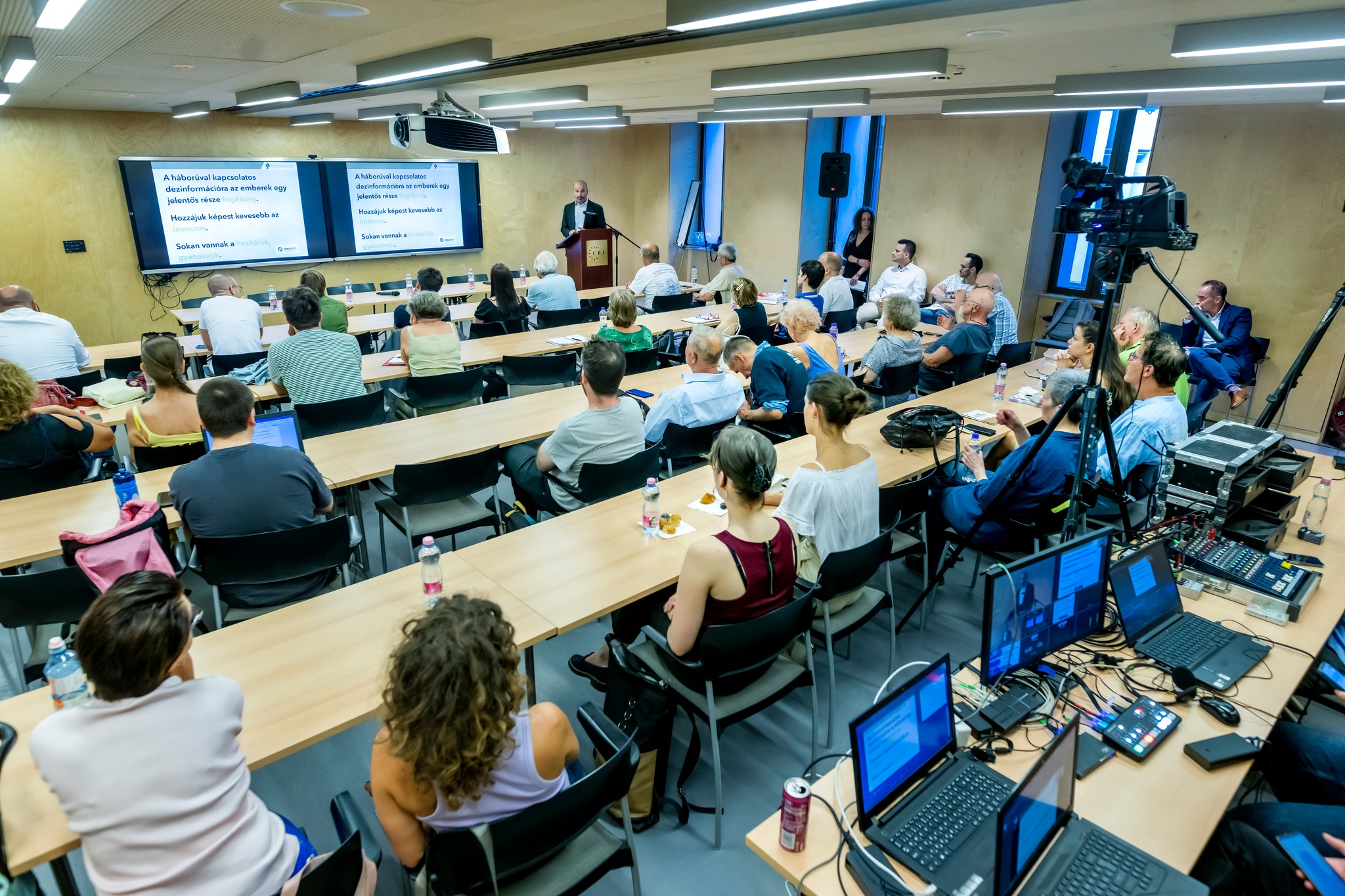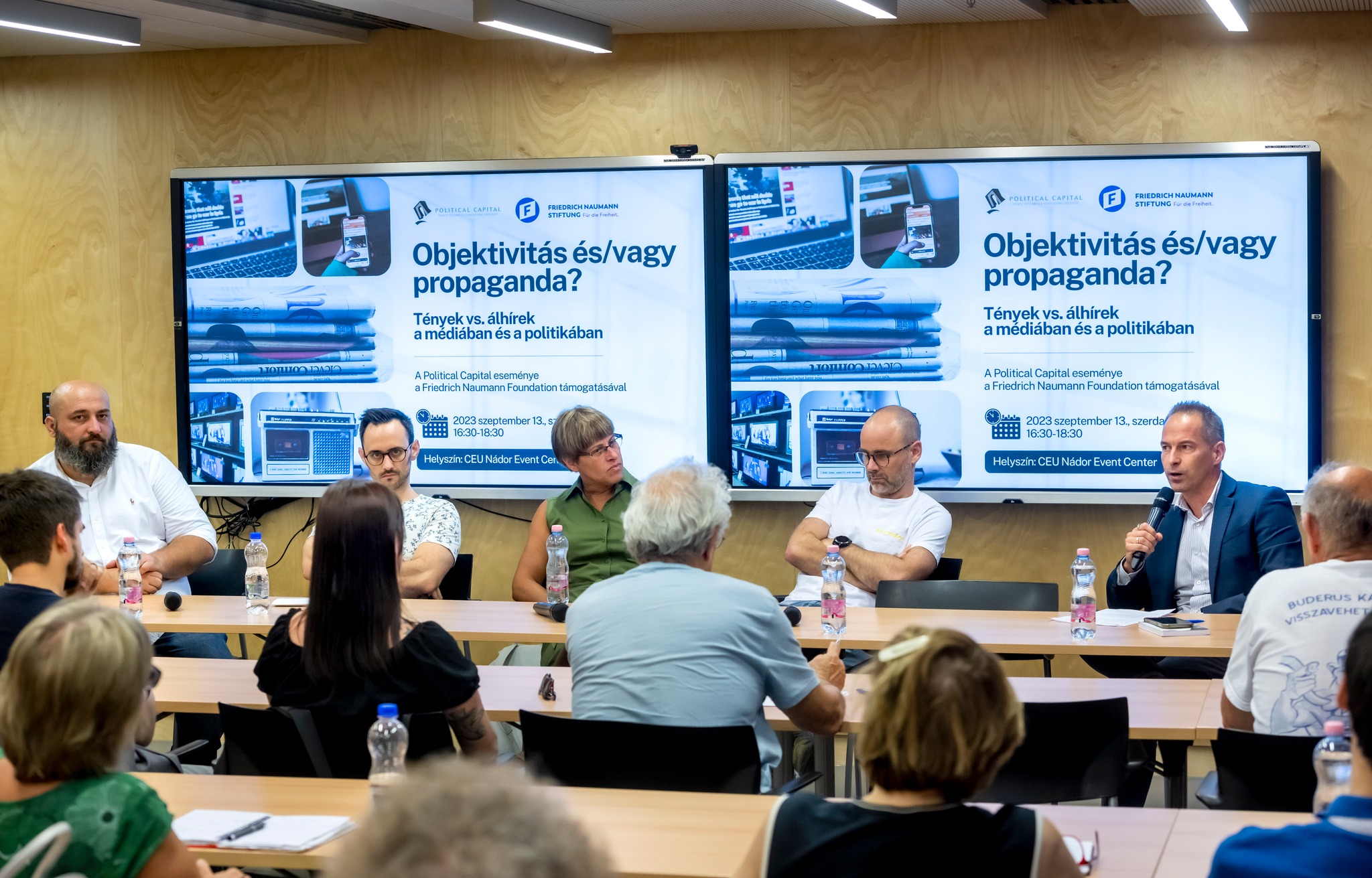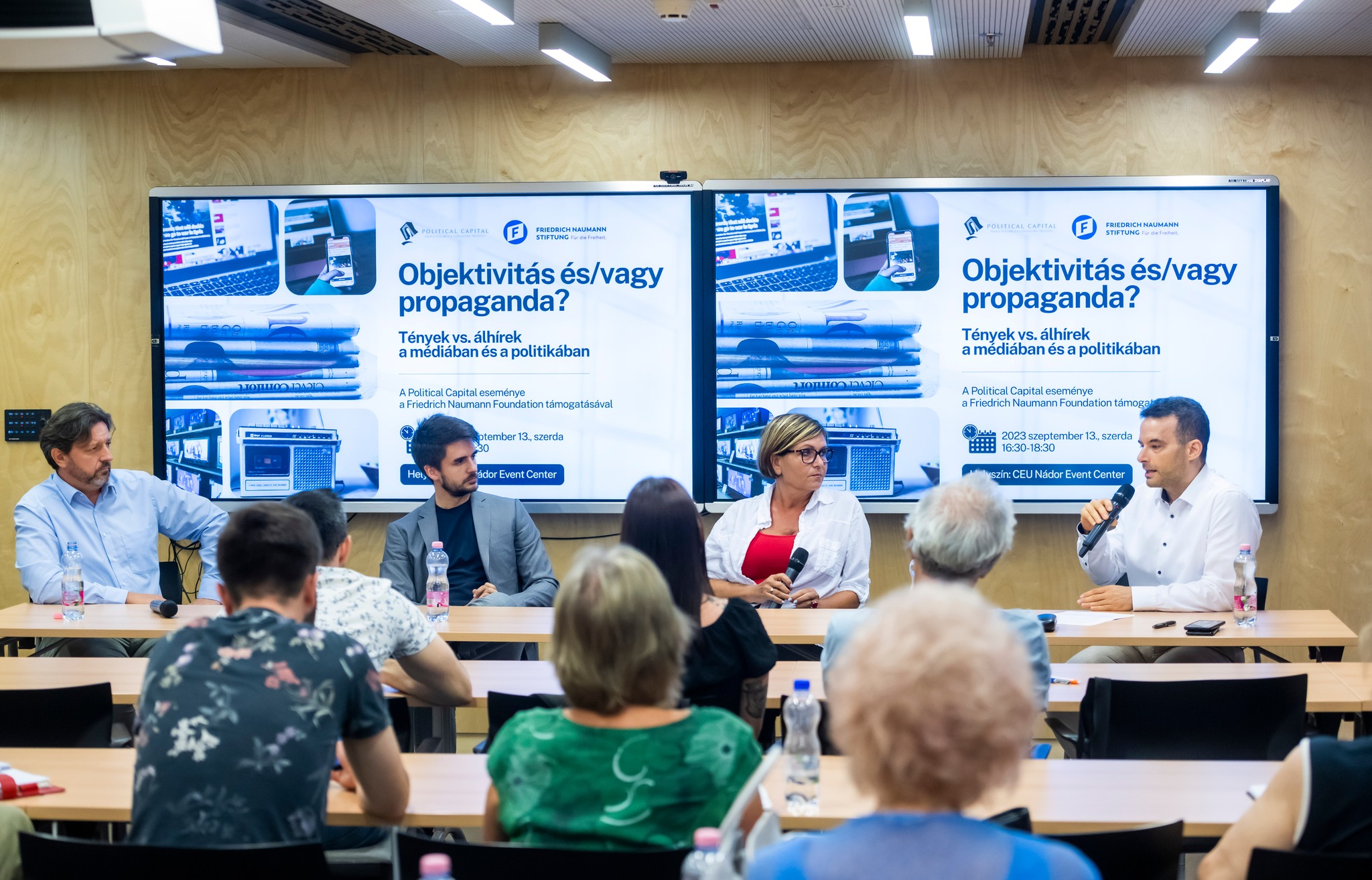Objectivity and/or propaganda? - Facts vs. fake news in media and politics
On the occasion of Political Capital's (PC) latest research on disinformation and conspiracy theories, we asked our guests about disinformation, objective reality, the growing politicisation of the media, and the parties becoming content creators.

In the first part of the event, Péter Krekó, director of PC, discussed with journalists and experts whether there is still a role for facts and objectivity in Hungarian politics and public life: whether party politics still has the power to shape public opinion and whether objective reality exists.
Ágnes Urbán, founder of the Mérték Médiaelemző Műhely (Mérték Media Analysis Group), believes that social patterns and public opinion are changing very rapidly in our time. Therefore, it is difficult to determine how much party politics has influence in accepting or rejecting the facts. Social media, COVID-19, and Russia’s invasion of Ukraine have all significantly contributed to the rise of disinformation. Research by Mérték has shown that the bubble effect in the media is over-dimensioned: in fact, very few people are exclusively exposed to news with a single perspective.
István Szilárd Pap, the editor of Partizán, said the question is whether parties/politicians polarize society or whether this results from a more profound process. Although it is not certain that a quantitative study can reveal this, it is clear that the institution of liberal democracy is in crisis. Therefore, voters are losing confidence in the institutions of political representation and are withdrawing, which is also reflected in their receptiveness to political participation. At the same time, the elites are retreating into the world of party bureaucracy and international institutions, creating a vacuum into which new political entrepreneurs have successfully entered: influencers and charismatic individuals whom voters increasingly trust more than traditional institutions. In his view, we are not living in a post-truth world but in a post-trust world. Rebuilding the trust and reducing the vacuum would be a counterweight to polarization and disinformation. Pap also said that too much emphasis is placed on the generators of disinformation and too little on the recipients. He also pointed out that the very concept of disinformation can be a weapon if it is deliberately overextended and stigmatizes authentic information.
Márton Bede, a journalist for 444, thinks that the role of party politics in accepting or rejecting facts is not unique to Hungary. He explained that the Hungarian government likes to use primitive, obfuscatory propaganda, but at the same time, it also uses tools similar to Russian disinformation to create uncertainty and confusion. The denial of objective and independent journalism is a perfect example of the latter.
Márk Finta, a journalist for Napunk and Pátria Rádió, spoke about the situation of the media in Slovakia, where trust in the mainstream media is very low (only 26%). In recent years, the goal of politics in Slovakia has been to persuade and control undecided voters. This was the reason for Igor Matovič's victory in 2020, when he won with 25% of the votes, while his party was only at 5% a few months prior to the election. During the campaign, the immediate messages were very effective, appealing to the deepest instincts of voters (e.g. fear). With these messages, Matovič was able to gain popularity among Hungarians in Slovakia, and more Hungarians voted for him than for Robert Fico. In the campaign for the upcoming Slovak elections 2023, an interesting situation has emerged among Hungarian voters in Slovakia: Viktor Orbán sees Fico as an ally who has had several anti-Hungarian actions in the past: the handling of the Malina Hedivg case or the banning of dual citizenship are hardly forgotten by Hungarians in Slovakia. It remains to be seen whether the pro-Orban electorate will be able to swallow the bitter pill and vote for Fico.

In the second part of the event, Róbert László, PC's election expert, asked politicians - among other things - whether the parties have new, valid answers to the challenges caused by disinformation and the bubble effect.
Olga Kálmán, MP of the opposition Democratic Coalition party (Demokratikus Koalíció, DK), referring to the research by Mérték, explained that opposition politicians cannot be satisfied with blaming every failure on the bubble effect. They must use all means to get the truth to the people, even through street and public forums. Kálmán stressed that the propaganda machine of Fidesz is getting more and more sophisticated every year, which may explain why five years ago, the “slave law” could be part of the public discourse, but today, the ever-growing media empire makes this impossible. According to Kálmán, the Orbán regime has also forced opposition parties to create their own media platforms, which can be seen as positive.
Márton Tompos, MP of the opposition Momentum party, said that parties do think about who they want to send certain messages to. The loss of trust in the facts is also due to social media, as anyone can comment on any topic on these platforms, even as a non-expert, thus eliminating the filter that used to be an important part of the media. In his view, there are currently four models of politics working among the opposition parties: someone who is funny (MKKP), someone with a scandalous style (Péter Jakab), an investigative style, who has an impact on the intellect (Ákos Hadházy) or someone who has an impact on emotions (András Jámbor). Tompos stressed that some politicians have to become content creators, but if you want to be a local MP or mayor, you only need to use certain parts of the media. A politician cannot focus only on social media, and the role of traditional media should not be underestimated.
Örs Tetlák, Deputy Mayor of Érd, said that the opposition parties' choice of topics and messages is as much a problem as the uneven competition with Fidesz. According to the deputy mayor, the problem is not that the opposition parties do not have messages with broad public support but that they do not have the resources to buy advertising with the same reach as the governing party. Tetlák believes that opposition politicians want to be media politicians, but instead, they should learn from Fidesz's terms in opposition when they successfully built up their base. Tetlák agrees with Tompos that credibility can be regained at the local level. The municipally owned press can also play an important role in creating local public service.

The research on which the discussion is based is available here (in Hungarian).
The full conference can be watched here (in Hungarian):
This summary was written by Dániel Szántó - intern of Political Capital.
The project was supported by the Friedrich Naumann Foundation for Freedom (FNF).
The Friedrich Naumann Foundation for Freedom is not responsible for the content of this publication or any use that may be made of it. The views expressed herein are those of the project owner and do not necessarily reflect the views of the FNF.

